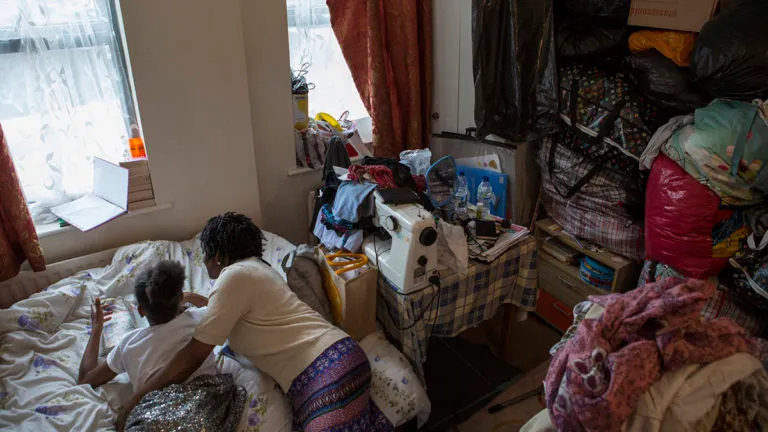Welfare safety net is broken, MPs find
Published: by Ami McCarthy

‘As a nation, I believe we all want a decent safety net: if you’re facing a difficult moment in life, the state should be there to help you.’ – Amber Rudd, Secretary of State for the Department of Work and Pensions, 11 January 2019.
The government says it supports the welfare safety net – but is it still working? Back in December 2018, we submitted evidence to the parliamentary work and pensions committee’s inquiry into the welfare safety net. The inquiry was looking at the state of the UK’s welfare safety net, gathering evidence and testimonials from experts, individuals and organisations across many fields, including hearing from our policy manager, Deborah Garvie.
Last week they produced their comprehensive findings. The report is a damning indictment of the systemic culling of the welfare system, a once treasured cornerstone of a proudly compassionate society.
The Local Housing Allowance freeze
Most benefits for working age people have been frozen since 2016. The committee rightly points out that by freezing already low benefit rates, they have now become ‘divorced from the real costs of living’. Nowhere is this more prevalent than with the Local Housing Allowance (LHA) rates – as the report details.
We know through our own research that as a consequence of the freeze, 97% of areas in England are unaffordable to rent a modest two-bedroom property on the LHA rate. It’s left to the family to make up any shortfall between the LHA payment and the rent; sometimes as much as £100 a month. These shortfalls are crushing, and sometimes insurmountable, even for the four in ten (39%) households claiming LHA who are in work. Families claiming LHA are being pushed into destitution as they try desperately to cover the rent at the expense of all else, month after month.
The committee echoed our campaign to restore LHA rates to the 30th percentile (the cheapest third) of market rents. Going forward, the government should commit to uprating LHA in line with market rents.
The benefit cap
The ‘undoubtedly harsh’ benefit cap has trapped many people who cannot work – including single parents and their children – in poverty. Our own submission to this inquiry included our research into the benefit cap that showed how lone parent families with young children were disproportionately affected. Single parent families with at least one child under five are 19 times more likely to be affected by the cap: these families comprise just 3% of all working age households in the UK yet make up over half of the households affected by the benefit cap.
Welfare reforms were intended to incentivise employment, clearly showing that if you work and contribute to society, you will be better off in myriad ways. The welfare system must not, however, be used as a mechanism to punish those who cannot work. Single parents with young children, who are disproportionately affected by the cap are classified as not being active job-seekers because of their caring responsibilities. The committee agrees with us. Mirroring our calls, they recommend that the benefit cap should not apply to single parents with small children.
Work must pay
According to research from the Social Metrics Commission featured in the committee’s report, ‘almost one in 10 households with children where all adults work full-time are in poverty. This increases to 37% in couple households with children where at least one adult is in part-time, and one in fulltime work.’
Our own research shows that 55% of homeless families are employed.
With stagnating wages, increasing rents and living costs, the government’s stated intention of making work pay is far from being fulfilled.
In conclusion
The Committee’s report concluded that the welfare safety net is not fit for purpose. In January 2019 Amber Rudd said in a speech ‘it is vital that people are supported by this safety net, not trapped beneath it’. Then it is vital that the safety net is returned to what it was intended to be. It is vital that it supports those who need it.
The safety net must be there to catch us all, should we ever need it, and provide necessary support. It should not be a punitive trap which we fear, where once fallen, we are forever ensnared.
We welcome the committee’s report and are extremely pleased to see their recommendations mirroring our own asks of the government. We eagerly await the response from the DWP.